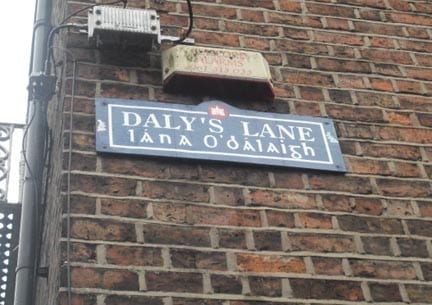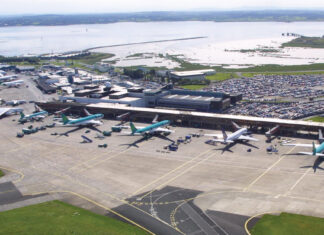FIVE projects led by community leaders have been selected by Limerick City and County Council as part of a programme to re-imagine Limerick’s Georgian Laneways.
As part of Limerick City and County Council’s EU project +CityxChange (Positive City Exchange) we are hoping to create a new community to drive innovation and fight climate change by working towards a positive energy city!
This is a community of individuals, groups, businesses and agencies who are looking at ways to develop smarter cities that are open and accessible for all.
We are all about the positives working together to solve problems or to create a new vision all through citizen engagement.
The overarching aim is to develop a series of demonstration projects on how to become a smart positive energy city for everyone.
Following a series of workshops, five groups have now been selected to develop their projects based around different themes for Limerick’ s Georgian Laneway seeing how they can be best utilised for the benefit of the city and those who live and work here.
Welcoming the selection Mayor of the City and County of Limerick Cllr Michael Collins said: “It is great to see such interest in revitalising our Georgian Laneways. They can be used for so many things, as highlighted by the range of projects selected.
“It is so important that we all work together on projects like these and that they are community/ group driven. It gives people ownership. Georgian Limerick is one of our great assets and we need to develop and enhance them in a sympathetic yet innovative way, and the +CityxChange project is helping to do that.” he said.
Dr Mihai Bilauca, Head of Digital Services and Leader of the +CityxChange project in Limerick City and County Council said: “+CityxChange is about finding innovative solutions to how we meet our energy consumption. Sometimes it isn’t just about new technology but we need to think about how we use energy and work to change our behaviour.
“Working closely with communities and fostering the resulting innovation is at the heart of this project. Having an open invitation for groups to collaborate and innovate we can co-create a place we can all share and enjoy. Often described as placemaking – we want to work together to define the place they want to live, work and play.
“Limerick’s Georgian quarter with its network of laneways creates an ideal opportunity to reimagine this extraordinary city asset into a collection of wonderful spaces. We want to capture the imagination of local community groups to start the transformation of Georgian laneways and use physical interventions such as new planting, improved streetscape and decoration supported by advanced technologies such as air quality and noise sensors.” Mihai added.
Claire Flynn from Limerick Mental Health Association said: “We are always looking for projects that bring people together and give us an opportunity to break down the stigma surrounding mental health.
“Bringing people from different communities together to work on a project really helps to foster cultural and community relationships. For the community that lives and works around Jesuit Lane it gives an opportunity to get to know each other, to create a safe and welcoming space close to home and work. For everyone else, it will draw people to walk the laneway, enjoy the art and flora.” she explained.
Ciarán O’Mara from Deepseek AI is involved in the Streetseek project: “Streetseek is a pilot programme by Deepseek AI & The University of Limerick, to measure the heartbeat of Limerick city.
“Innovative technology has been developed to gather deeper insights into how people engage with public spaces in our city. This is achieved with personal privacy as a priority. We use thermal cameras which are based on temperature readings, in contrast to conventional visual cameras.
“The goal of Streetseek, is to provide in depth detail into how our city is used, to facilitate smart planning and decision making into the future.” he concluded.
The five projects are:
| Project | Organisations | Location | Description |
| Green Museum 2 | Limerick Mental Health Association
Collaborators: Hunt Museum, Women’s Group and Men’s Shed |
Jesuit Lane | This project will bring the Museum to the laneway, with CO2 absorbing plants -as a service to the environment. |
| StreetSeek | DeepSeek AI | Little Catherine Street initially with others to be added | This will focus on drone technology and machine vision; they envisage that their un-intrusive thermal cameras can derive insights about city life and behaviour. |
| Green Museum 1 | Hunt Museum
Collaborators: Enable Ireland, Urban Designer Harris, LIT |
Griffith Row or Theatre Lane | Transforming the laneway with 3D printed examples of Hunt Museum Art pieces (using recycled ink) in a permaculture garden, with CO2 absorbing plants |
| Wall of Belonging | Liveable Limerick
Collaborators: Peoples Museum, Limerick Civic Trust, European Expo 2020 |
Mews, Upper Hartstonge Street | Transforming the Mews laneway into an Art Gallery. with an InstaWall similar to that in Paris, a Wings of Europe Mural. |
| Incredible Edibles | Limerick City Tidy Towns
Collaborators: Bedford Row, Limerick Mental Health |
Daly’s Lane | This project envisages transforming a Georgian laneway into a hanging garden, where the public can pick and enjoy fruits and vegetables. |
All groups will be able to proceed with their pilot projects despite the Covid-19 restrictions and while adhering to the latest public health advice and guidelines.
They will work collaboratively with the support of Limerick City and County Council and use the services of Citizen Observatory and FabLab to realise their visions for the laneways.
For more information please check www.limerick.ie/CityxChange.






